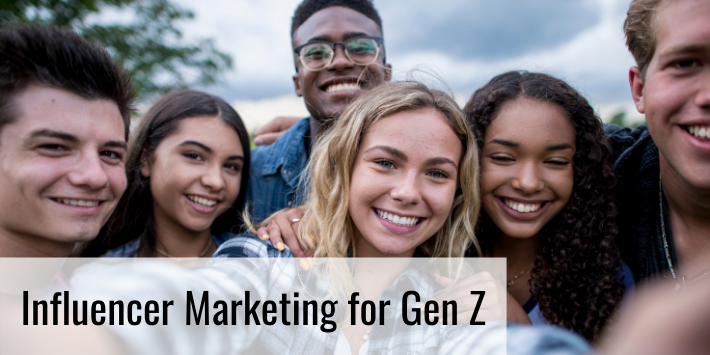Until recently, the generation getting the most buzz when it comes to influencer marketing was Millennials, but change is definitely underway. Generation Z is coming of age and marketers are starting to turn their attention to what is promising to become the largest and most economically powerful generation in American history. Influencer marketing for Gen Z seems like the obvious way to reach this highly plugged-in audience, but this group’s unique behaviors and preferences means that brands need to evolve their outreach strategies to truly engage this audience.

Gen Z, born between 1996 and 2012, are the first true digital natives who have no memory of a world before smartphones and always-on Internet access. While Gen Z already has an impressive spending power of $143 billion (which can be expanded to $600 billion, considering the influence they have on their parents’ spending), their earnings are set to hit $33 trillion by 2030, surpassing Millennials’ spending power the year after.
Influencer Marketing for Gen Z – Top Tips
As more and more brands look to connect with this large and lucrative market, it’s becoming clear that the secret to success lies in relevance — and the best way to achieve relevance with Gen Z is through the right kind of influencer marketing.
Generation Z’s Defining Characteristics
Every generation has its own unique set of preferences, attitudes, and buying behaviors, and Gen Z is no different. Gen Zers are more racially and ethnically diverse than previous generations, and they’re predicted to be the most educated generation to date. They value individuality, mobilize for a variety of causes, and expect brands to take a stand on key social and policy issues.
This is a group that tends to view consumption as a means of personal expression: Gen Z is thoughtful about the brands they buy from and the companies they support.
It may be tempting to assume these traits only apply to Gen Z, but these young consumers are greatly influencing the way people of all ages and backgrounds consume and relate to brands. Gen Z members are becoming increasingly important players in establishing value-led consumer trends and purchase decisions, thanks to their passion for the issues that matter most to them.
Sway Group CEO Danielle Wiley Talks with JUV Consulting on all thing Gen Z
Gen Z Wants Authenticity
This generation sees online identity as true self-expression; their reality is that the internet is the lens through which consumers view the world. Successful marketing for this generation won’t come from traditional advertisements or corporate sales jargon: Gen Z demands personalization, transparency, and authenticity.
The same is true for influencer marketing programs. Any Gen Z influencer campaign that simply features a product promotion in an uninspired, commercial manner is likely to be tuned out, or worse, actively alienate audiences.
Interestingly, 82% of Gen Z says they trust a company more if it uses images of real customers in its advertising. Influencer marketing can be the ideal strategy for reaching this generation, leveraging the appeal and credibility built up from young creators who authentically represent Gen Z’s experiences.
Purpose Matters: More Expectations for Brands
Gen Z expects brands to step up and speak out in order to drive change on important issues impacting society. Not only are they demanding that brands be socially accountable, they’re willing to put their money behind their values: 72% say they’re more likely to buy from a company that contributes to social causes.
This is a generation who is driven to make real impact and is taking a stand on issues, and they expect no less from the companies they buy from. For Gen Z, silence is complacency, and even corporate statements aren’t enough if they aren’t backed by action.
Brands should understand that Gen Z wants to support companies that stand for more than the products or services they sell. In order to win this generation’s loyalty, businesses need to show how they serve communities and society — not just sales bottom lines.
Respect Gen Z’s Differences
Gen Z, like every other generation, is a sprawling heterogeneous category that spans a vast range of demographics and characteristics. It can be tempting to rely on labels as a sort of shorthand to define generational differences but do not make the mistake of lumping all of Gen Z together into one monolithic group.
It’s critical for marketers to recognize that Gen Z exists on a continuum with plenty of individual variation. Within this age group, there are important nuances and divergences in opinion, along with a great variety of wants, needs, aspirations, and mindsets.
One of the best ways to identify and honor these differences is to actually engage in dialogue with Gen Z stakeholders, whether through social media engagement or connecting with influencers.
Brands who hire Gen Z influencers should view the partnership as more than having the right-age mouthpiece for a promotion: it’s a chance for a deeper understanding of who they are and what they care about. Working with Gen Z creators can be an effective way to show a product to lots of young people, but more importantly, it’s an ongoing opportunity to join the conversation and build rewarding connections with this generation.
Don’t Try to Go Viral with your Influencer Marketing Campaigns
Don’t waste time and effort trying to latch on to the latest Gen Z fad in order to appeal to this market. Brands who take this approach rarely get it right: not only do young consumers see right through corporate trend bandwagoning, but by the time a campaign gets launched most audiences have moved on.
This advice can be extended to influencer partnerships as well. While there’s no doubt that big-name young influencers offer a tempting amount of star power, don’t get so caught up in those seemingly impressive audience numbers that you ignore fit in favor of followers.
When evaluating potential Gen Z influencers for a sponsorship, it’s important to consider everything the creator has to offer. Their follower count is relevant, but so is their audience demographic (you want an influencer whose followers and your target audience are one and the same!), their personality and style, their values, their aesthetic, and their diversity.
Of course every brand wants that pitch-perfect viral moment, but the truth is they tend to happen organically in unplanned ways. For example, who could have predicted that the second most popular TikTok in 2020 would be a guy breezing down the highway on a skateboard, drinking cranberry juice and vibing to Fleetwood Mac?
Considering the unlikely outcome of engineering a campaign that will go viral among Gen Zers, it’s a better strategy to stay tuned in to what’s resonating — and be ready to leverage the right kind of complimentary outreach.
Dunkin’ Donuts successfully took this approach with Gen Z TikTok star Charli D’Amelio, partnering with her to develop a signature drink called “The Charli.” Not only did the chain sell hundreds of thousands of drinks within the first five days of its launch, the partnership drove a significant increase in app downloads.
If your brand is constantly chasing trends and one-off moments, you’re always going to be several steps behind. Prioritize relevance over buzz, focus on delivering real value, show how your brand is walking the talk when it comes to company values, and definitely resist any temptation to co-opt trending social justice issues.
Let Gen Z Shape Your Brand Language
(Rather Than Copying Theirs)
Gen Z has a notoriously strong B.S. filter for today’s saturated media climate. If your marketing includes, say, a meme format from 2017, or a reference to your product as being “lit AF,” it’s a fairly strong indicator that you don’t really know what Gen Z is interested in — you’re just hoping that copying their trends will lend credibility to your brand.
(If you need a reminder that mimicking popular memes and slang in order to appeal to younger audiences can backfire in a big way, there are innumerable examples of brands receiving backlash for exactly that practice.)
An effective strategy for avoiding a cringeworthy campaign is to partner with a Gen Z influencer who can genuinely speak to their generation’s values. Influencer marketing campaigns should never be about paying a creator to simply repeat company slogans and sales pitches. Instead, allow Gen Z to shape brand messaging with their own perspectives and opinions and share it in a way that’s relevant to their like-minded audiences.
By giving influencers the flexibility to share your brand message in their own way, you greatly improve the chances of a campaign that’s consistent with the current trends on target platforms, and consistent with the creator’s actual persona and passions.
The Final Word on Influencer Marketing for Gen Z
There’s no question that Generation Z is on its way to becoming the hottest consumer group for marketers to target. Understanding who they are and what they care about is key: invest in listening and paying attention to this rapidly-growing cohort, or better yet, bring them into the process. Tactics will come and go, but the brands who figure out how to most authentically connect with Gen Z are the ones who will find true success.

